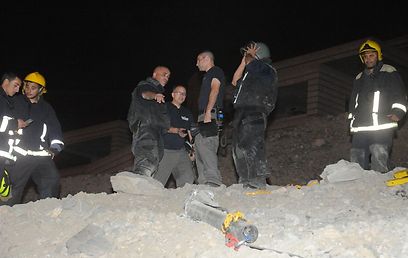Don't count on Egypt
Op-ed: Rocket attack on Eilat looks like sign of things to come, Israel should hit Sinai terrorists

Police tighten security...
The rocket that exploded near residential buildings in Eilat last week surprised residents of the southern city but not defense and intelligence officials. While there was no specific warning, IDF, Shin Bet and police officials recently estimated that rocket and mortar attacks from Sinai on Eilat are merely a matter of time.
The political leadership was also aware of the threat, yet the knowledge it was about to materialize did not resolve the main dilemma: How should Israel curb and respond to strikes from Sinai and border attacks without prompting a grave deterioration in our relationship with Egypt and jeopardizing the peace process?
By now it's clear that the Egyptians won't be doing the job for us – not because they don't want to, but rather, because they cannot. Their control in central and eastern Sinai is weak. Hence, the IDF and Shin Bet must do the job of thwarting terror attacks if they want it to be done efficiently.
In order to do this, Israel needs an active system comprising three components: An effective fence (half of it is already built,) thorough intelligence gathering from the air and on the ground, and the ability to use air, ground and possibly naval forces to hit terrorists. In short, a similar arsenal to what is used by Israel on the Gaza Strip border.
Rocket explosion in Eilat (Photo: Yair Sagi)
The results of the latest round of escalation in Gaza showed militant groups in the Strip that the effectiveness of rockets is declining rapidly. Moreover, the IDF's success in thwarting attempts to plant bombs near the Gaza fence makes it clear toIslamic Jihad, the Popular Resistance Committees and other groups that this terror channel has largely exhausted itself. Hence, the Sinai Peninsula has become the preferred theater for Gaza groups seeking to carry out attacks and fire rockets.
Should Israel fail to respond with determination and create deterrence in the near future, we shall quickly find ourselves facing a similar situation to the one that prevailed in Gaza after the 2005 withdrawal. It appears that the rocket fire from Sinai will be growing, not only in scope but also in range, size of warheads, and accuracy.
Hamas, Islamic Jihad and the PRC possess heavy, long-range Grad and Fajr 5 rockets. It's easy to transfer them to the Sinai via tunnels without anyone knowing about it. This means that not only Eilat is in danger, but also communities further north. Ironically, Gush Katif evacuees who moved there may again find themselves under fire. While this is not an existential threat, it is disturbing nonetheless and requires a response.
Israel will likely turn to the diplomatic channel first, and soon. We shall see contacts with the Egyptians, and Washington will also be enlisted to the cause in an effort to press Cairo. At the same time, Israel must immediately act on the military front, in line with the principle adopted by the IDF last summer – a response against Gaza targets for every attack originating in the Sinai, regardless of who perpetrated it.
Should the diplomatic and deterrence efforts fail and rocket fire from Sinai will escalate, Israeli decision-makers will have to mull the option of allowing the IDF and Shin Bet to operate in the Sinai. This will require significant financial costs, yet the other option is the grave economic damage to tourism and port activity in Eilat and vicinity as result of rocket fire.
In fact, Israeli decision-makers barely have any room for consideration on the matter. They must adopt any reasonable means at their disposal in order to safeguard our citizens, even at the price of undermining the peace treaty with Egypt.
Simultaneously, Israel must boost its deployment and preparation to defend the home front in Eilat and the southern Negev desert. However, deploying the Iron Dome missile defense system in Eilat is impractical, as this would leave hundreds of thousands of citizens vulnerable in central and southern Israel.
This isn't a simple dilemma, yet the government and defense establishment better formulate a quick solution, before the attacks on the deep south escalate and spin out of control.
|


